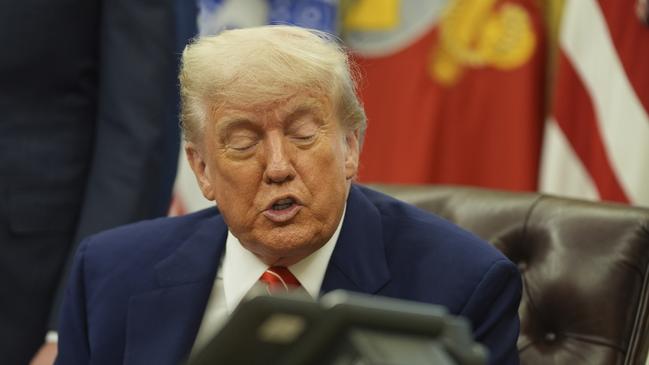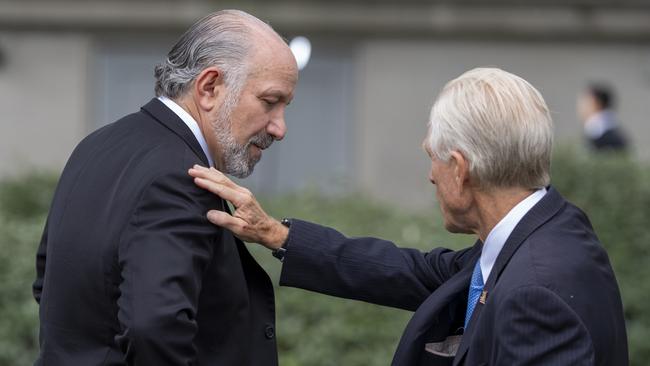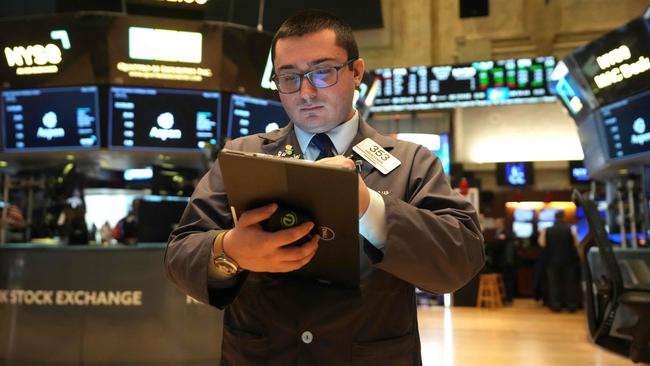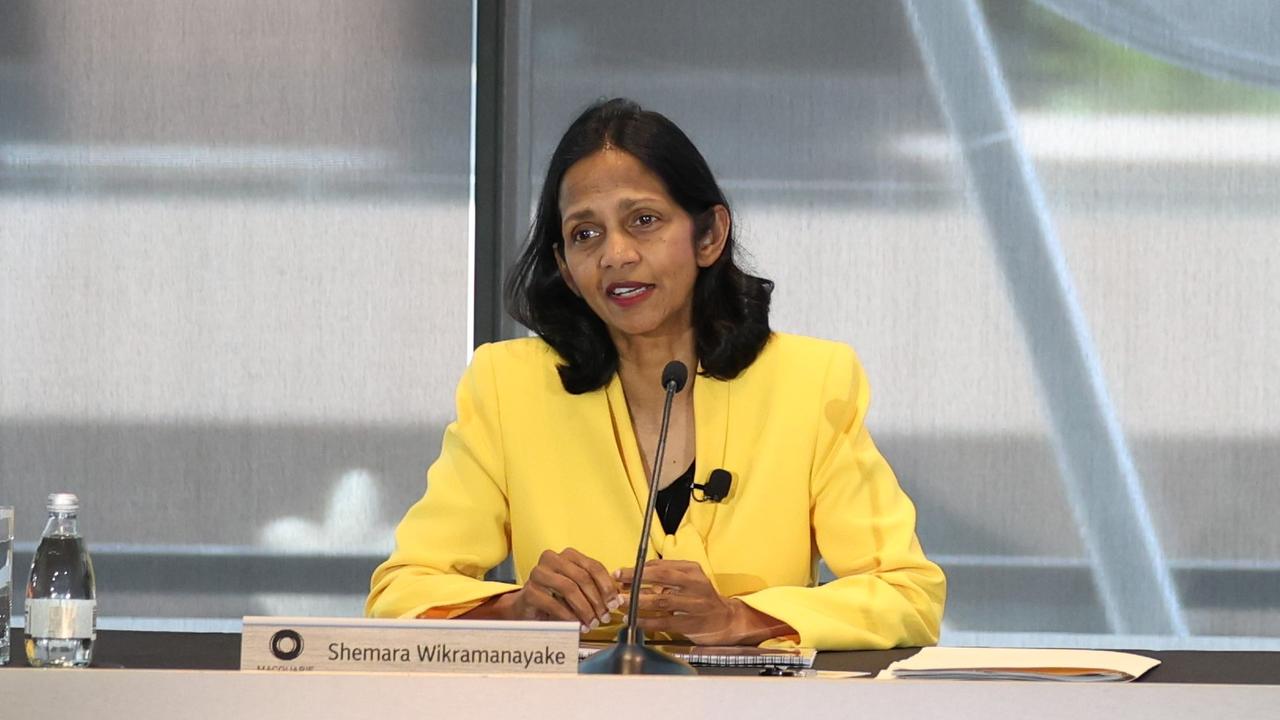ASX closes at a two-month high in the lead-up to weekend trade talks between the US and China
The Australian sharemarket has been buoyed to its highest point in two months by the preliminary deal between the US and UK as weekend talks with China loom.

Business
Don't miss out on the headlines from Business. Followed categories will be added to My News.
Trade deal optimism has lifted stocks this week putting the Australian market at a two-month high.
There’s been a strong rebound since early April as the US administration paused its reciprocal tariff plans for most countries – and shares were supported by news of a preliminary US-UK deal as well as US-China trade talks this weekend and reassurances from the US administration of many trade deals to come.
The US-UK deal will lead to tariff reductions on UK steel, aluminium and vehicles in return for commitments to import US beef, aircraft and ethanol. It also appeared to lay a foundation for preferential treatment for the pharmaceuticals tariffs the US is considering.
It would have been one of the easiest deals to make, given the strength of the US-UK alliance and the fact that the US runs a trade surplus with the UK. But it left the 10 per cent baseline US tariff in place and, by itself, won’t alleviate the stagflation risk highlighted by the US Federal Reserve this week. Goldman Sachs said it will lower the US effective tariff rate by less than 0.1 percentage point.
However, investors saw it as a sign that US tariffs would eventually come down and the mood music was positive for the US-China talks in Switzerland. Bloomberg said the US was “contemplating a potentially dramatic tariff reduction in a de-escalatory move that would see both sides slash duties from prohibitive levels set last month to temper the economic pain both are already starting to feel”.

The US has “set a target of reducing tariffs below 60 per cent as a first step that they feel China may be prepared to match” and “progress in two days of scheduled discussions could see those cuts being implemented as soon as next week,” Bloomberg said.
While announcing the trade deal with the UK, US President Donald Trump told reporters that “you better go out and buy stock now”.
He insisted the economy would “be like a rocket ship that goes straight up”. He also took an unusually optimistic tone on talks with China.
“I think we’re going to have a good weekend with China,” he said. “Who made the first call, who didn’t, it doesn’t matter. It only matters what happens in that room, but I will tell you that China very much wants to make a deal,” he said.
Goldman Sachs expects the US and China to remove the retaliatory tariffs in the next few weeks, leaving in place a still substantial tariff increase of 54 and 34 percentage points respectively.
And US commerce secretary Howard Lutnick said the US was “going to roll out dozens of deals” on trade over the next month or so.
But for the second time this week Mr Trump said he might soon repropose country-specific tariffs.
“There’ll be a time … where we’re just going to make the deal,” Mr Trump said on Thursday.
“We don’t need the country involvement because we’ve already had it.
“And we’ll say this particular country which had big surpluses … is going to pay a 25 per cent tariff, or a 30 per cent, or a 50 per cent, or 10 per cent or whatever it may be.”
While both the UK deal and Mr Trump’s comments on China point to tariff de-escalation, Goldman Sachs cautioned that many US trading partners still faced country-specific tariffs.
“While we do not expect the ‘Liberation Day’ tariff rates to take effect at the end of the 90-day pause, it’s increasingly likely that some if not most US trading partners will soon face a renewed threat that country-specific rates will take effect, and points to a higher chance that the US might impose those rates on at least a few trading partners,” Goldman Sachs chief political economist Alec Philips said.
Meanwhile, updates from corporate Australia at the Macquarie Australia Conference were better than expected and the average stock was outperforming the broader market by 1.4 per cent on the days of their presentations.

The Macquarie conference, which had presentations from 117 companies over May 6-8, marks the unofficial start of “confession season” in Australia. It was the first opportunity for investors to hear from a wide range of companies about the potential impact of tariffs imposed in recent months.
Although while the trade war was in focus, Australia was generally seen as less impacted, and expected to be supported by Reserve Bank interest rate cuts.
With multiple downgrades leading into the conference and still high tariff-related uncertainties, it was shaping up as a “downgrade conference”. But while some companies lowered their guidance reductions or gave soft updates, there were fewer profit warnings than expected and there were also some welcome upgrades, according to Australian equity strategist Matt Brooks.
“The 27th Macquarie Conference shows companies continue to manage well through another period of uncertainty, this time driven by Trump and tariffs,” he said.
“However, unless there is a material de-escalation of US-China tariffs, there is growing risk to FY26 earnings and another round of soft guides in August to reset street expectations lower.”
He said investor views at the conference were mixed, and some were “hoping the worst is over, while others were waiting for the other shoe to drop”.
Macquarie’s model portfolio is overweight on some of the defensives like CSL, Ramsay Health Care, Coles and Newmont, and rate-cut beneficiaries like Mirvac, GPT, APA and Transurban that presented at the conference – as the broker still thinks equity markets could test April lows.

Some companies had already shifted supply chains to mitigate tariffs, while others were ready to adjust if they become subject to tariffs, while the prospect of goods deflation from higher China imports may be positive for retailers.
Mr Brooks cautioned that tariff-related uncertainty and the hit to confidence was a factor in travel downgrades and could also drive delays to investment projects.
Capital inflows into real estate were impacted by tariff uncertainties, although Charter Hall Group noted a rotation of flows from the US to Australia.
Australia was highlighted as an attractive investment destination, with positive demographics, low unemployment and stable government after the election.
The ALP’s housing policies, plus expected RBA rate cuts were seen as positive for companies exposed to the housing sector, the consumer and interest rates.
AI was overshadowed by tariffs, but companies were “innovating and getting productivity benefits”, while cost cutting continued to be a focus for many and uranium was back in favour as utilities returned to the contract market, Mr Brooks said.
Originally published as ASX closes at a two-month high in the lead-up to weekend trade talks between the US and China



